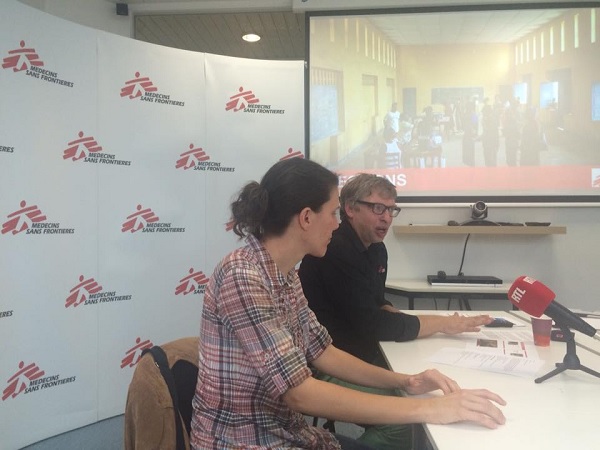
On Friday 29 July 2016, Luxembourg nurse Tessy Fautsch presented her experiences during the Medecins Sans Frontieres’ (Doctors without Borders) mission in the Democratic Republic of Congo.
Upon her return from the Democratic Republic of Congo (DRC), Tessy Fautsch explained that up to 50 % of patients severely infected by yellow fever die within fourteen days of contracting the infection. Tessy Fautsch, a nurse from the MSF in Luxembourg, was sent to the DRC for three months with the aim to provide vaccinations against yellow fever in the city of Matadi. In Kinshasa, she contributed to the vector control management activities (in the fight against mosquitoes), as project coordinator.
The yellow fever epidemic began in December 2015 in Angola and spread to the DRC. In order to try and contain this epidemic, the MSF have sent many of their teams to the two countries.
Yellow fever is an acute hemorrhagic viral disease transmitted by infected mosquitoes. Yellow makes reference to the jaundice reaching some patients. The Aedes Aegypti mosquito is the primary vector of yellow fever. It also transmits dengue, Chikungunya and Zika. There is no treatment against yellow fever and vaccination is the most effective method as prevention. Symptoms include fever, headache and muscle aches. Some patients have a phase of running a high fever and internal bleeding. According to WHO, up to 50% of severely affected patients die within 14 days.
In DRC, 68 cases of infection have been confirmed since end of February 2015, and 75 deaths have been reported. The majority of these cases concern people coming from Angola. However, there have also been reported cases of the yellow fever in Central Congo and Kwango, on the border with Angola.
Tessy Kautsch has been contributing to the campaign that aims to provide vaccinations to the two million inhabitants of Matadi issued by the Congolese Ministry of Health, since 26 May 2016. This project is part of a programme that is a response to the yellow fever outbreak in DRC covering two health zones in Kinshasa and nine areas in Central Congo.
“After killing more than 350 people in Angola since the end of December 2015, the yellow fever epidemic has spread to other neighboring countries. The MSF’s goal was to vaccinate the 370,000 people in the city of Matadi. Our target population was the general population above nine months of age, very young children and adults. In ten days, we vaccinated 370,000 people. An entire city, that's a lot of people. People were very happy to come and get vaccinated, because it is the only way to effectively protect against yellow fever,” explained Tessy Fautsch.
In addition to this, Tessy Fautsch also contributed in the vector control management actions in Kinshasa. These actions are to fight against the Aedes mosquito, the vector of the yellow fever. The actions include: house spraying or fumigation to kill adult mosquitoes and destruction of breeding sites such as waste or containers with standing water where mosquitoes lay eggs. These actions are performed where cases of the yellow fever have been confirmed, or in prone places such as hospitals, schools and markets.
“We experienced some apprehension difficulties by launching these activities, because people do not really make the difference between Ebola and yellow fever. But ultimately, the spraying and fumigation took place without difficulties. People were even disappointed if we did not pulverise their homes,” Tessy Fautsch added.
“To curb the risk of spreading the disease, it is imperative to be vigilant and responsive. There is no specific treatment against yellow fever. Prevention through targeted vaccination and vector control activities therefore remain the best weapons against the disease,” she further commented.
The MSF is calling for donations to be able to continue its activities in the Democratic Republic of Congo to fight against the spread of yellow fever.
“My mission in Matadi and Kinshasa was successful, but many colleagues have just been sent to participate in the project throughout the region, with the yellow fever as a common enemy. I count on you to give the means to protect those who risk their lives by a simple mosquito bite. In these tropical regions, each vaccination campaign is a challenge, I hope you will help us!” she concluded.
Members of the public can make a donation to this MSF appeal via the following bank account: CCP LU75 1111 0000 4848 0000, or alternatively online at www.msf.lu
Photo by Josefine Emilie Andersen








